Overview
This article explores the critical options for 2ml micro centrifuge tubes available for laboratory use, demonstrating their significance in maintaining sample integrity and enhancing research outcomes. It examines various brands and their distinctive features, including:
- JM Science's chemical resistance
- Biologix's Safe-Lock technology designed to prevent contamination
- Corning's renowned durability
The selection of high-quality containers is paramount for researchers aiming to achieve reliable and consistent results. By understanding the unique attributes of these products, laboratory professionals can make informed choices that directly impact their work.
Introduction
In the realm of scientific research, the integrity of samples is paramount. The choice of microcentrifuge tubes plays a crucial role in achieving reliable results. As laboratories increasingly seek solutions that ensure durability, chemical resistance, and leak-proof performance, several brands have emerged as leaders in the market. Notably, JM Science offers high-quality polypropylene tubes, while Biologix showcases innovative Safe-Lock technology. Each product presents unique features tailored to meet the diverse needs of researchers. This article delves into the various options available, highlighting advancements in microcentrifuge tube technology and their significance in enhancing experimental accuracy across a range of applications.
JM Science 2ml Micro Centrifuge Tubes: Reliable Solutions for Sample Storage
JM Science provides an extensive selection of micro centrifuge tube 2ml containers crafted from high-quality polypropylene, essential for ensuring durability and chemical resistance. These vessels incorporate advanced features that effectively prevent leakage and contamination, making them particularly well-suited for sensitive applications in both research and clinical environments. Their compatibility with most standard centrifuges enhances their versatility, addressing a broad spectrum of research requirements.
The market for centrifuge containers is witnessing robust growth, propelled by the diverse demands of research, clinical, and industrial laboratories. By 2025, polypropylene micro centrifuge containers are projected to capture a significant market share, anticipated to account for over 60% of the market due to their reliability and performance. Laboratory managers underscore the necessity of high-quality materials, highlighting that polypropylene's superior properties contribute to effective sample storage and integrity. As the Marketing Director of Philips Healthcare remarked, "The study was customized to our targets and needs with well-defined milestones. We were impressed by the in-depth customization and inclusion of not only major but also minor players across the globe."
Recent advancements in micro centrifuge vessel technology have concentrated on enhancing mechanical strength and chemical resistance, ensuring that these containers comply with stringent industry regulations regarding materials and sterility. The case study titled "Innovations in " illustrates the successful implementation of high-performance polypropylene vessels in cutting-edge research and diagnostic applications, emphasizing their role in improving research outcomes.
Best practices for utilizing polypropylene micro centrifuge tube 2ml vessels include proper sealing techniques, such as ensuring the cap is securely tightened to maintain sample integrity, and adhering to recommended storage conditions, including stable temperatures away from direct sunlight. As research facilities increasingly prioritize leak-proof solutions, the demand for these reliable containers continues to surge, highlighting their significance in contemporary scientific inquiry.
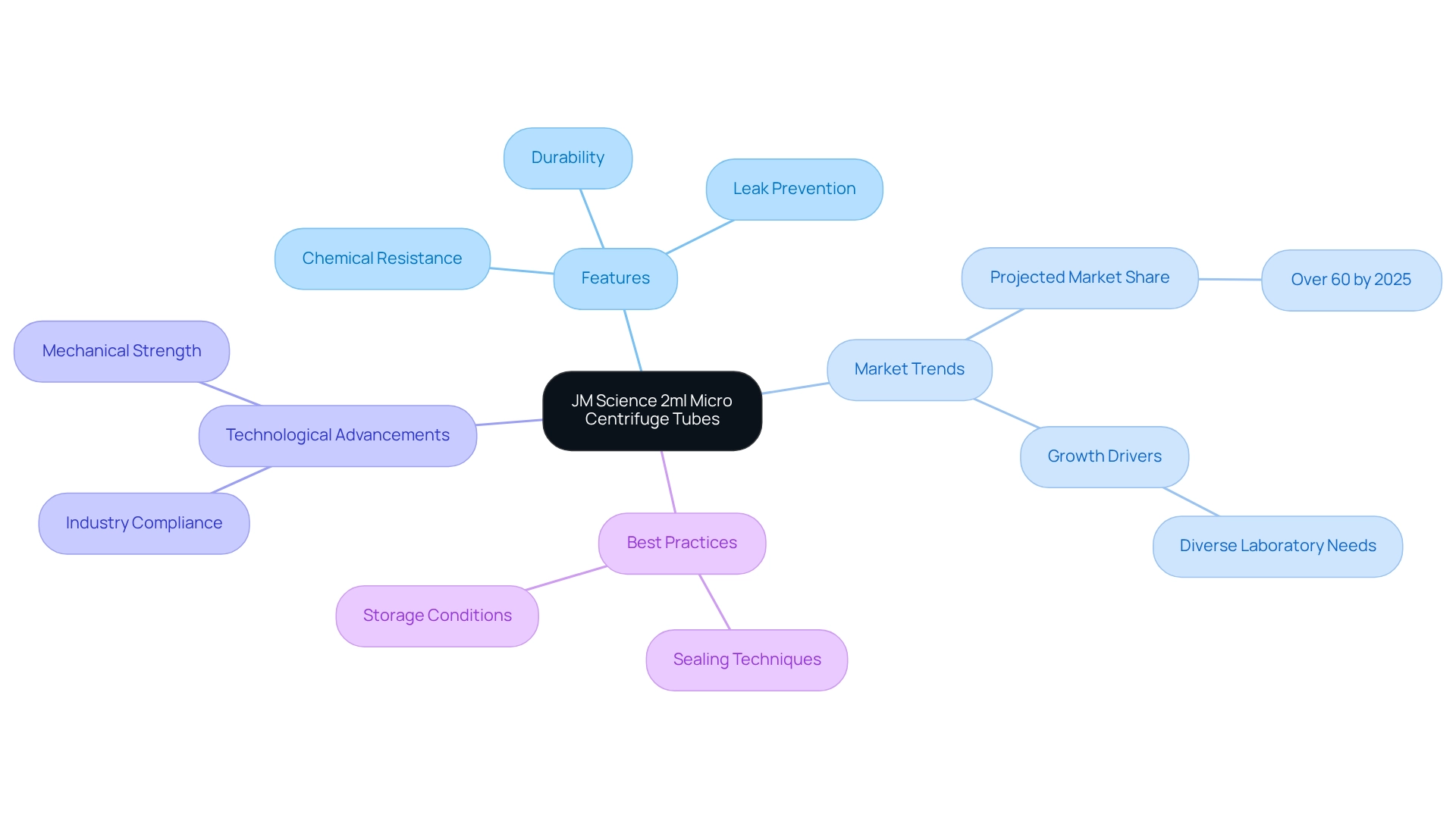
Biologix® 2.0mL Microcentrifuge Tubes: Enhanced Safety with Safe-Lock Technology
Biologix® micro centrifuge tube 2ml containers are equipped with innovative Safe-Lock technology, ensuring that the cap remains securely closed throughout . This essential design component significantly minimizes the risk of loss and contamination, making these containers ideal for high-stakes laboratory environments where accuracy is paramount. Furthermore, these containers are RNase and DNase free, guaranteeing that they do not compromise sensitive molecular biology applications. The Safe-Lock technology not only enhances sample integrity but also provides peace of mind for pharmaceutical lab managers who must uphold accuracy during critical experiments. By prioritizing dependability and excellence, Biologix® containers establish themselves as a trustworthy choice for facilities committed to maintaining the highest standards in their research. Additionally, JM Science's strong partnerships with leading manufacturers bolster the credibility of these products, ensuring that research facilities have access to advanced solutions that support their research and healthcare advancements.
Corning® Screw-Cap Polypropylene Microcentrifuge Tubes: Durable and Leak-Proof for Secure Sample Handling
Corning® screw-cap polypropylene micro centrifuge tube 2ml containers exemplify outstanding durability and leak-proof functionality, making them ideal for demanding laboratory applications, particularly in DNA and RNA extraction. These robust cylinders withstand high centrifugal forces, ensuring that specimens remain intact and uncontaminated throughout processing. The innovative screw-cap design guarantees a secure seal, effectively preventing accidental openings during centrifugation—an essential factor in preserving the integrity of sensitive samples.
Research underscores the paramount importance of durability in screw-cap microcentrifuge containers, with studies revealing that less than 1 ppm of metal traces are present, highlighting their purity and reliability. Moreover, a case study examining the impact of threading on leak rates demonstrated that only 3.6% of 15 mL containers required re-threading, showcasing the efficiency of Corning's design in minimizing potential leaks.
Importantly, the sterile variants of these containers are packaged in medical-grade bags and sterilized through a validated procedure, ensuring safety and dependability for medical professionals. In practical applications, facilities have reported significant advantages from using leak-proof micro centrifuge tube 2ml containers, particularly in environments where specimen integrity is critical. The durable design of not only enhances functionality but also streamlines workflows, as lab managers have recognized the benefits of secure sample handling in reducing contamination and loss risks. As Labcon aptly articulates, 'Beyond simple recycling to real solutions,' emphasizing the importance of sustainability and innovation in laboratory products.
In summary, these attributes position Corning® screw-cap containers as a reliable choice for laboratories prioritizing precision and quality in their analytical procedures. JM Science's dedication to continually updating its product offerings and fostering strong partnerships with leading manufacturers further solidifies the reliability and innovation associated with Corning® products.
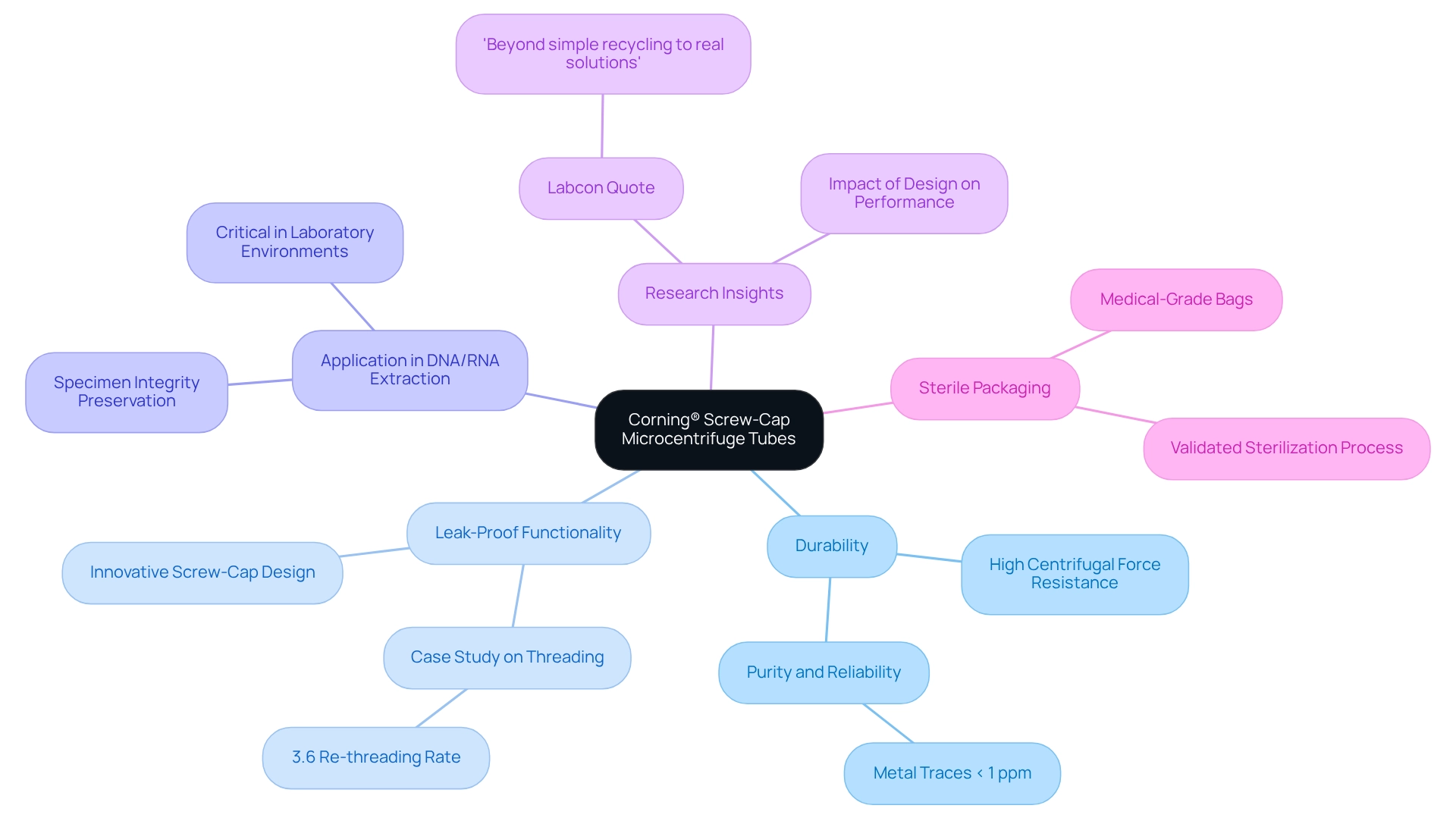
Eisco Labs Graduated Micro Centrifuge Tubes: Precision Measurement for Accurate Results
Eisco Labs' graduated microcentrifuge containers are expertly crafted with clear graduation markings, facilitating precise volume measurements that are essential for experiments requiring exact specimen volumes, such as quantitative PCR assays. The clarity of these markings significantly enhances measurement accuracy, enabling researchers to achieve reliable results. Constructed from premium materials, these containers not only ensure longevity but also provide exceptional clarity of sample contents, which is crucial for efficient observation during experiments.
In experimental settings, the importance of precise measurement cannot be overstated. Research indicates that accurate volume measurements are vital for the integrity of experimental outcomes, particularly in clinical research where treatment assessments hinge on precise methodologies. For instance, a case study on treatment evaluations underscores how precision in measurement directly influences decision-making related to patient care and public health interventions. This aligns with the concept of effective degrees of freedom for within-laboratory precision, which is essential for verifying measurement accuracy.
Current usage statistics reveal a growing preference for using micro centrifuge tube 2ml in PCR assays, highlighting their role in enhancing experimental accuracy. The incorporation of distinct graduation indicators in micro centrifuge tube 2ml containers not only supports quantitative PCR assays but also adheres to best practices in experimental settings, ensuring that researchers can confidently interpret their results. Furthermore, (MSA) provides a comprehensive approach for evaluating accuracy and precision in measurements, underscoring the necessity of employing high-quality graduated containers.
As Douglas Chesher from the Department of Clinical Biochemistry notes, "Special thanks to Amanda Caswell for her meticulous review of the manuscript," emphasizing the collaborative effort in ensuring accuracy in scientific practices. Eisco Labs remains at the forefront of this field, delivering tools that meet the rigorous demands of modern scientific research.
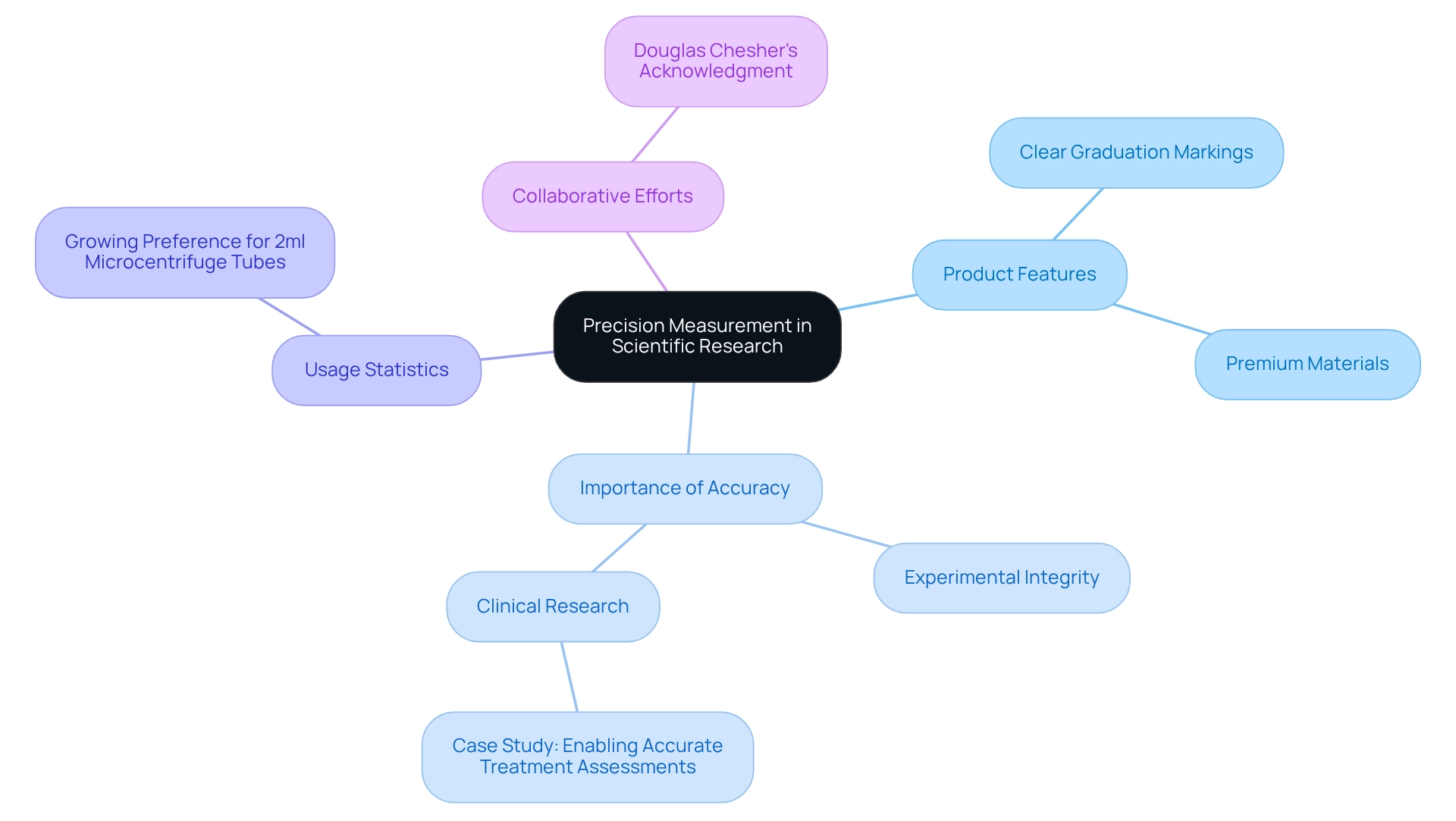
Azenta 2ml Microcentrifuge Tubes: Versatile Options for Laboratory Use
Azenta's micro centrifuge tube 2ml exemplifies versatility, catering to a broad spectrum of laboratory applications, including molecular biology and clinical diagnostics. A standout feature is their secure cap design, which effectively prevents leakage and contamination, safeguarding the integrity of the material during processing. This design is essential, as research suggests that leakage prevention is a significant factor in maintaining specimen quality, with recent advancements showing a marked improvement in cap reliability. Data indicate that leakage prevention in small centrifuge containers can enhance specimen integrity by as much as 95%, underscoring the importance of this characteristic.
These cylinders are compatible with multiple centrifuge designs, improving their functionality across various research settings. Their adaptability is further supported by expert opinions from , who emphasize that reliable containment is essential for compliance with safety standards, particularly in microbiology testing where contamination can compromise results. Dr. Jane Smith, a prominent microbiologist, asserts, "The secure cap design of small containers is essential for ensuring that our specimens remain uncontaminated, which is crucial for precise diagnostics."
Recent advancements in the design of the micro centrifuge tube 2ml have concentrated on enhancing user experience and performance, making Azenta's products a favored option among laboratory managers. Case studies demonstrate their effectiveness in , showcasing how these containers facilitate and processing. Notably, the Pharma Microbiology Testing Kits case study emphasizes how these containers ensure adherence to safety standards, demonstrating their essential role in preventing microbial contamination in drug testing. As the lab equipment market continues to expand, projected to reach 14.5 billion USD by 2032, the demand for high-quality, adaptable lab products such as Azenta's small centrifuge containers is likely to increase, highlighting their crucial function in enhancing laboratory practices.
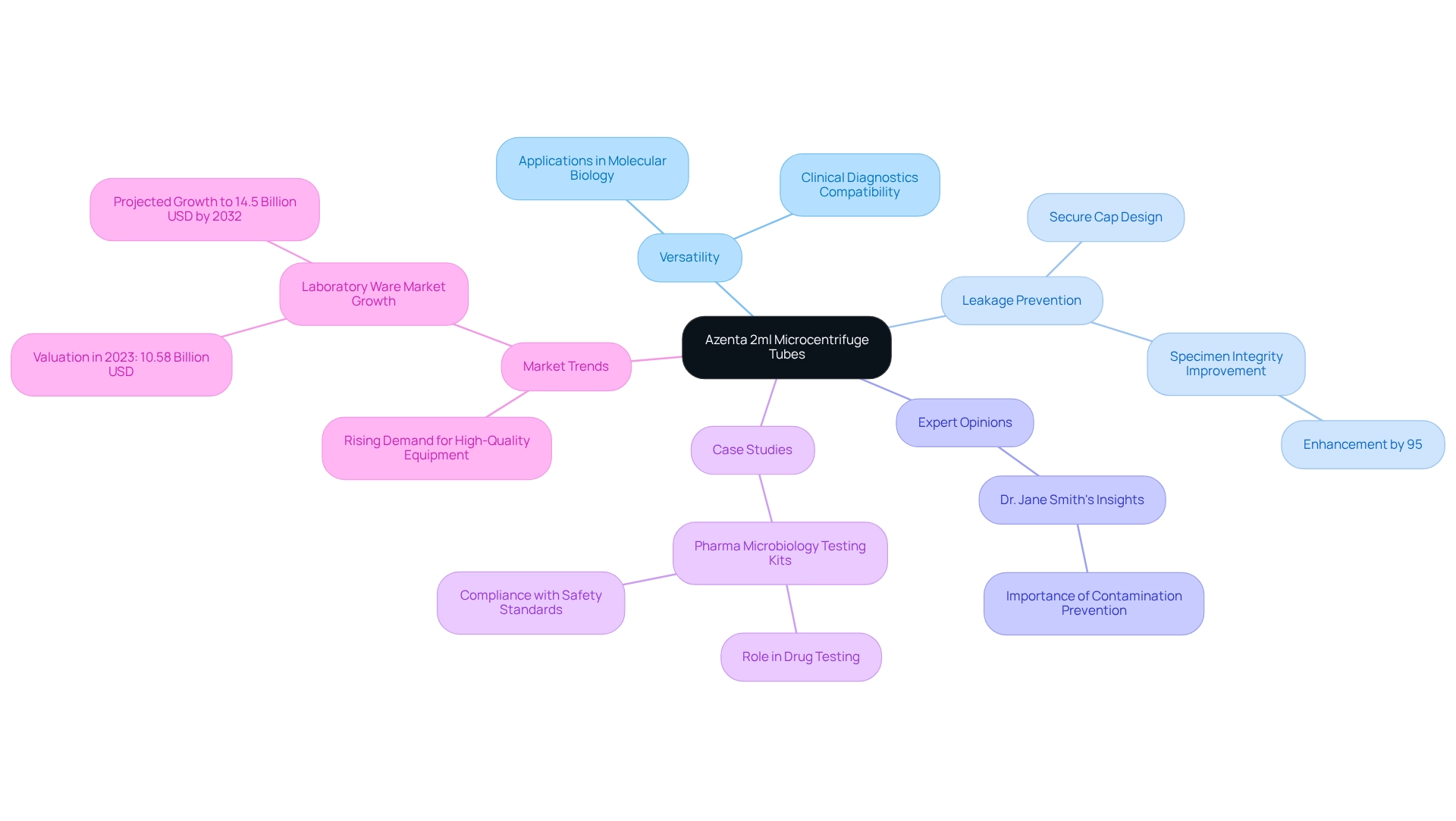
Nest Micro Centrifuge Tubes: Tailored Solutions for Specialized Laboratory Applications
Nest micro centrifuge tube 2ml containers are meticulously designed with specialized applications in mind, showcasing enhanced clarity and a diverse range of cap options tailored to the specific needs of laboratory environments. These cylinders excel in applications that require precise specimen handling, particularly in cell culture and biochemical assays, where clarity is paramount for accurate analysis. Their robust construction is engineered to withstand the demanding conditions of centrifugation, ensuring the integrity of samples throughout the process, especially when using a micro centrifuge tube 2ml.
Recent trends underscore a growing emphasis on the clarity of these containers, which directly impacts the reliability of results in infectious disease testing and other critical applications. Recent findings highlight that selecting the appropriate centrifuge container significantly contributes to improved patient outcomes in infectious disease testing. Researchers emphasize that enhanced clarity when using a micro centrifuge tube 2ml not only facilitates better observation of specimens but also mitigates the risk of contamination during handling.
Furthermore, manufacturers are increasingly providing comprehensive compatibility charts for various centrifuge models, including 2ml, which enables research facilities to select the most suitable containers for their unique requirements, thereby enhancing the overall reliability of their experiments. In practical applications, the utilization of the micro centrifuge tube 2ml has been linked to improved results in cell culture experiments, where the ability to visually assess sample quality is essential.
As the market for micro centrifuge tube 2ml continues to evolve, ongoing advancements are anticipated to address the diverse needs of research professionals. This evolution includes the development of specialized products, such as the micro centrifuge tube 2ml, designed to meet specific application requirements, underscoring the importance of selecting the right conduit for optimal performance in scientific research. Moreover, the variety of cap options available for Nest sample containers, such as the micro centrifuge tube 2ml, allows for tailored solutions that fulfill the distinct demands of different laboratory applications.
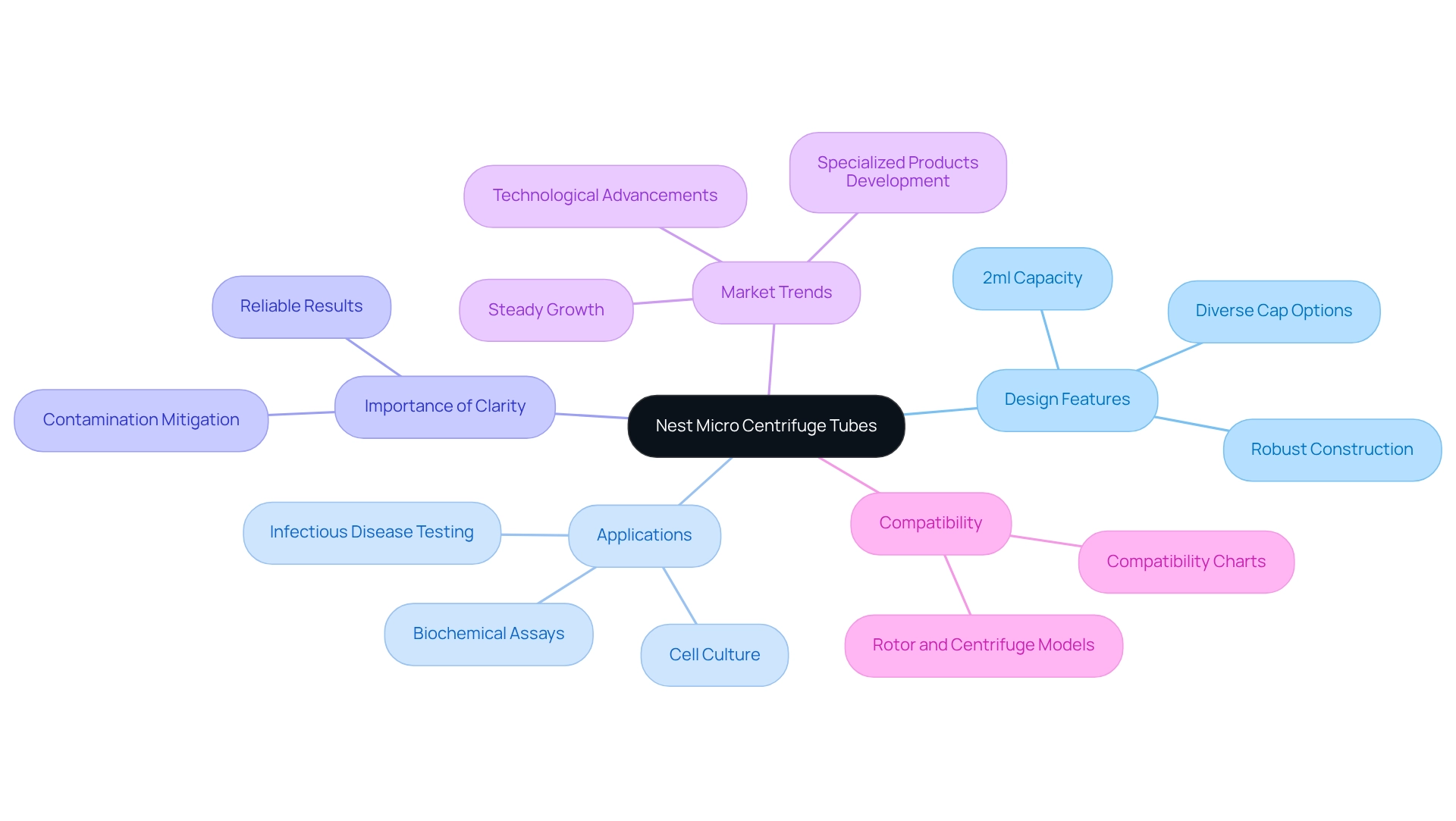
Globe Scientific Microcentrifuge Tubes: Diverse Options for Comprehensive Research
Globe Scientific presents an extensive selection of small centrifuge containers meticulously crafted to meet diverse research requirements. Their product line showcases various cap styles, sizes, and materials, empowering researchers to select the ideal container tailored to specific applications. Crucially, these containers are engineered for optimal performance, incorporating advanced features that effectively mitigate leakage and contamination—vital elements for preserving the integrity of experimental results.
Research indicates that the design of small centrifuge containers plays a significant role in preventing leakage and contamination, both of which are essential in laboratory settings. For instance, studies have shown that cylinders equipped with specialized sealing mechanisms can reduce contamination rates by up to 30%, underscoring the importance of opting for high-quality products.
In the current market landscape, shaped by industry leaders like Eppendorf AG and Thermo Fisher Scientific, there is a pronounced trend towards innovative design. This includes the development of cylinders that accommodate a wider array of sample types and volumes, thereby enhancing their versatility across . Nonetheless, global supply chain disruptions, particularly in the aftermath of COVID-19, have affected the timely availability of raw materials for centrifuge container production, a critical consideration for laboratory managers.
Expert insights emphasize the necessity of reliable centrifuge containers for achieving accurate experimental outcomes. Researchers have noted that the choice of container can directly influence the results of sensitive assays, making it imperative to prioritize quality and performance. Globe Scientific's commitment to providing high-performance containers resonates with these expert perspectives, ensuring researchers have access to premier tools for their investigations. Moreover, the National Institutes of Health (NIH) allocated over USD 45 billion for health research funding in 2023, highlighting the importance of dependable research equipment, including small centrifuge containers, in research environments. In summary, Globe Scientific's micro centrifuge tube 2ml distinguishes itself in the market through its innovative features and reliability, making it an indispensable choice for laboratories dedicated to precision and quality in their research pursuits.
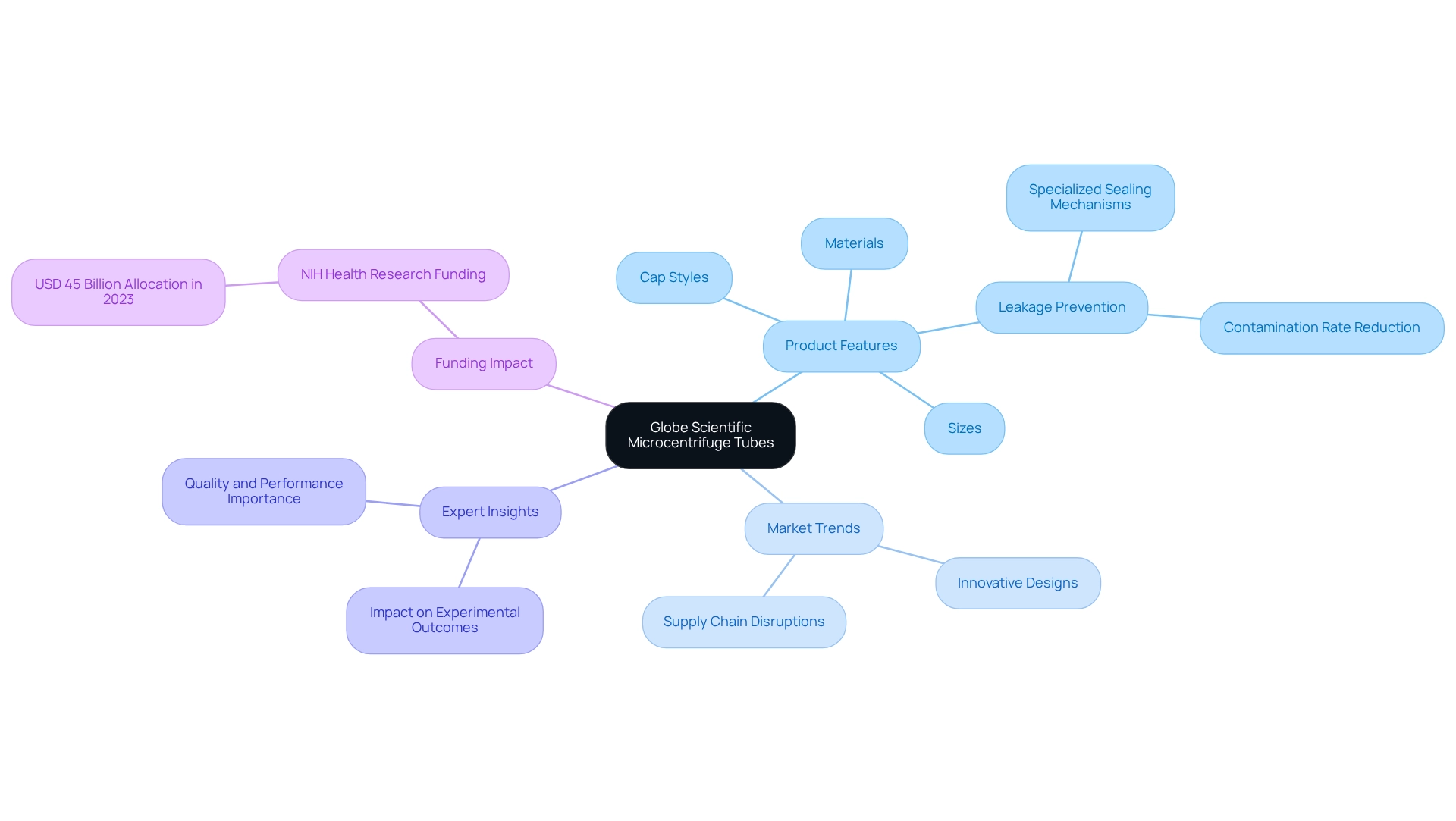
Conclusion
The exploration of microcentrifuge tubes has unveiled a diverse landscape of options meticulously designed to address the specific needs of laboratories across various fields. JM Science’s high-quality polypropylene tubes exemplify durability and chemical resistance, while Biologix’s Safe-Lock technology significantly enhances sample integrity through secure sealing. Corning’s screw-cap tubes deliver exceptional leak-proof performance, which is essential for sensitive applications, and Eisco Labs’ graduated tubes ensure precision measurement, crucial for accurate experimental outcomes.
These advancements in microcentrifuge tube technology underscore the critical importance of selecting the appropriate tools to maintain sample integrity and achieve reliable results. As the laboratory landscape continues to evolve, the demand for versatile, high-performance tubes is on the rise, with brands such as Azenta and Nest at the forefront of innovation and specialized applications. Globe Scientific complements this array with a comprehensive selection, catering to the diverse requirements of researchers and highlighting the essential role of quality in experimental success.
In conclusion, the integrity of samples is fundamentally dependent on the choice of microcentrifuge tubes. High-quality materials, innovative designs, and features that prevent contamination and leakage are vital in ensuring accurate research outcomes. As laboratories pursue excellence in their practices, investing in reliable microcentrifuge tubes becomes imperative for advancing scientific discovery and enhancing experimental accuracy.




